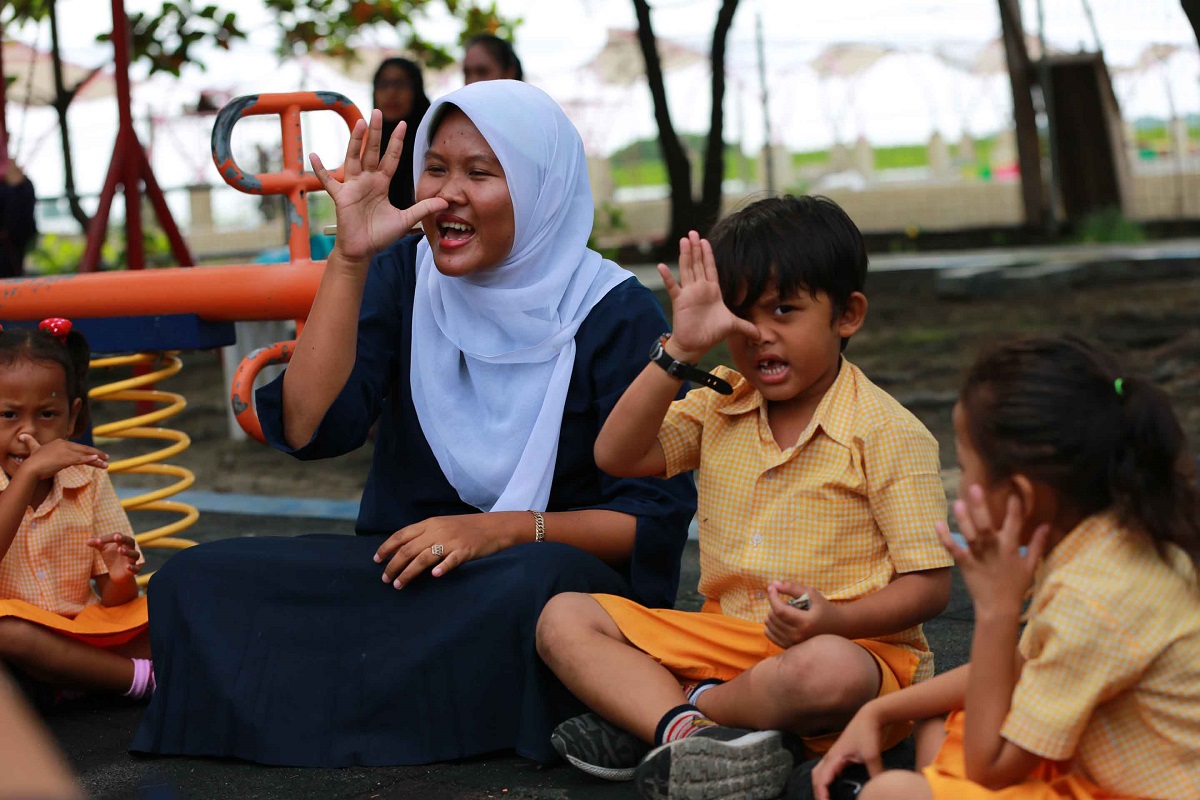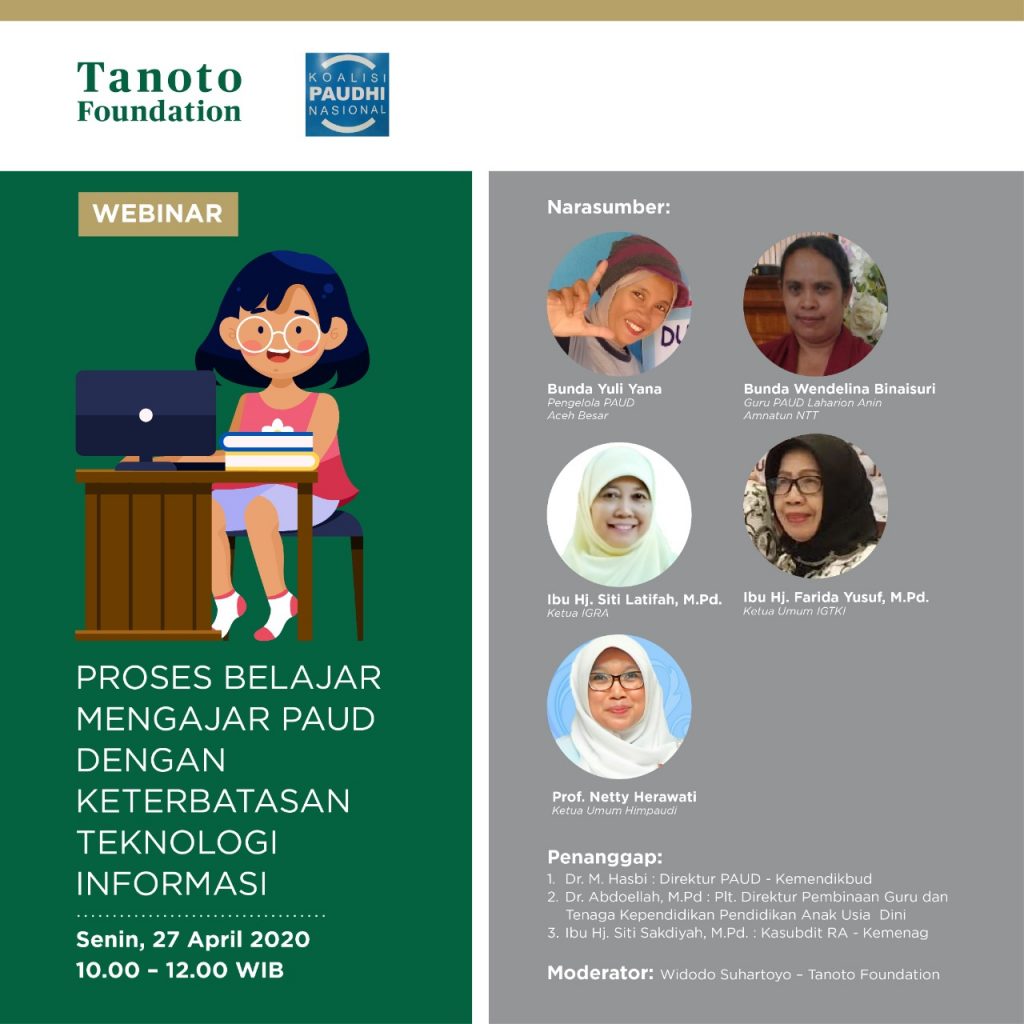Tanoto Foundation Holds Webinar to Help Address Challenges in Online Early Childhood Education During Covid-19

(Illustration photo was taken by Tanoto Foundation in 2019)
The COVID-10 pandemic has caused a shift in the way we do things, with our homes now being the center for many of our activities. This situation is a new reality for how education is being conducted, including early childhood education (PAUD).
Teachers, students and parents are all living a “new normal” of learning by using information technology and electronic media so that teaching and learning can still take place. And in such a context, all parties are expected to be able to optimally carry out their respective roles in the teaching and learning process.
Due to this, Tanoto Foundation, an independent family philanthropy organisation founded by Sukanto Tanoto and Tinah Bingei Tanoto in 1981, through our Early Childhood Education and Development (ECED) program (which orients towards early childhood care to prepare school-ready generations) collaborated with the Ministry of Education and Culture to hold a webinar activity themed “Teaching and Learning Process with Limited Information Technology” on Monday (April 27).
Eddy Henry, Tanoto Foundation Head of ECED, opened the event which had speakers comprising Prof. Netty Herawati (Chairperson of HIMAPAUDI), Yuli Yana (Manager for a PAUD in Aceh Besar), Wendelina (PAUD Teacher in Timor Tengah Selatan), Farida Yusuf (IGTKI) and Siti Latifa (IGRA). Representatives from the Ministry of Education and Culture were also part of the speaker panel, and included Dr. Muhammad Hasbi (PAUD Director) and Abdoellah, MPd (Acting Director of PAUD Teacher Development and Education Personnel). The Ministry of Religious Affairs was represented by Siti Sakdiyah, MPd (Head of Islamic Kindergarten Sub-Unit).

In his opening remarks, Eddy explained that the initiative was initially encouraged by the Ministry of Education and Culture and Tanoto Foundation had taken up the call by carrying out the webinar, citing its concern for the gaps in access to the Internet, capacity to use learning applications, and financial capabilities, in each region.
“Various challenges faced by early childhood education institutions at the kindergarten level during this pandemic can be resolved immediately and the proposals raised in this discussion can later help reach a wider community,” he said. “We can press the PAUSE button for some activities, but we cannot do it in terms of the growth of our children.”
Meanwhile, Prof. Netty Herawati stressed the importance of Freedom of Learning so that both teachers, parents and students can enjoy the education process at home.
“This is the time to make everyone happy by better understanding what the basic needs of children are while fulfilling the main goals of PAUD: upholding religion and inculcating values such as courtesy, willingness towards worship, and filial piety. Don’t stress because parents have to fill the learning plan forms and teachers have to report what they did to the Ministry of Education and Culture,” she said.
Dr. Hasbi explained the efforts made by the ministry to address the situation during the Covid19 pandemic, including ensuring how all parties are utilizing a variety of learning applications, such as Anggun PAUD, Friends of Families and Learning Center (for families who have access to technology). Children in households without access to online technology can utilize TVRI (national television).
“What if they can’t access the internet and TVRI? We still need to retain the same principals – firstly to ensure the happiness of children while they learn. Second, to ensure the safety of students, parents and teachers. Visits to homes to install the required Internet technology can be done so long as the area concerned is not within the pandemic emergency protocol (red zone), ” he said.
“The Minister of Education and Culture’s Order No. 20/2020 is also expected to help the learning from home process, because it directs that school funds be used to (1) purchase data packages/internet quota for teachers and students (2) purchase required learning platforms. The respective heads of units have discretion on how to cover the cost of transport and honorariums for teachers,” Dr Hasbi said, in closing the session.
You can find the presentations in the links below:
2. “Corona, Internet and TVRI” presentation
3. “Study at Home Challenges” presentation
4. “Learning in PAUD with Technological Disadvantages” presentation from Siti Latifah
5. “Learning in PAUD with Technological Disadvantages” presentation from Wendelina Binaisuri

Leave a Reply